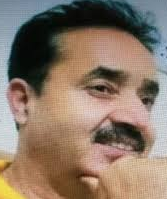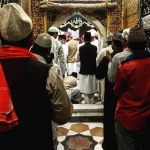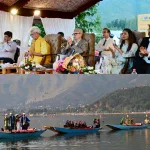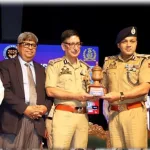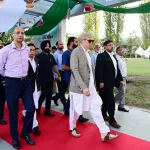THE TORN VEIL
“If everyone fought for their own convictions, there would be no war.” These haunting words by Leo Tolstoy from his monumental work ‘War and Peace’ echo like a moral cry across centuries, refusing to be silenced even as the guns roar again in the subcontinent. The eruption of war between India and Pakistan—two nations tied by geography, history, and tragedy—has once more drawn the map of South Asia in crimson and smoke. Amid the cries of retribution, the roar of fighter jets, and the rattling of sabers across diplomatic podiums, the question returns with devastating urgency: What, after all, is the true cost of war, and where does peace vanish in its shadow?
Tolstoy’s novel, often mistaken as merely a war chronicle, is in fact a philosophical meditation on human folly, the illusions of glory, and the deep yearning for meaning amidst destruction. The soldiers in War and Peace, much like the ones now marching across borders or stationed on snow-laden outposts, are seldom the architects of war. They are its instruments, swept along by forces greater than their volition—patriotism, power, paranoia, and pride.
The recent cycle of violence unleashed in the aftermath of the Pahalgam massacre and India’s forceful retaliation has dragged both nations to the precipice of a wider, possibly irreversible conflict. As military targets are destroyed and death tolls rise, one wonders who truly benefits—certainly not the mother awaiting her son’s return, nor the orphaned child looking for answers in ruins.
In every war, history becomes both weapon and witness. The India-Pakistan conflict is not new; its roots run deep into partition wounds, territorial disputes, and religious polarization. But even as the script of hostility repeats, what remains shockingly fresh is the ease with which the voices of peace are silenced.
Tolstoy’s world—fraught with the vanity of emperors and the quiet dignity of peasants—offers startling parallels. He did not romanticize war; he dismantled it. He revealed the generals to be fallible, the conquests to be hollow, and the soldiers to be human—vulnerable, frightened, sometimes noble, but rarely in control of the destiny being written in their names.
In the Indian and Pakistani narratives, each side considers itself wronged, provoked, and compelled to act. The truth, however, often lies in the graveyards of nuance. War becomes a theatre where reason is replaced by rhetoric. The recent destruction of terror camps in Pakistan-occupied territories by Indian forces has been lauded by some as a “surgical purification” of festering threats, while others see it as a spark that may ignite an uncontrollable blaze.
Between justifications and condemnations, the common man is reduced to a mere statistic. The television debates glorify action, the military announcements declare victories, but neither speaks for the silence that follows a funeral.
Peace, in contrast, is not theatrical. It is slow, often dull, and rarely sensational. It does not photograph well. And yet, it is peace that builds, nourishes, and heals. The Indus Waters Treaty, a long-standing emblem of diplomatic sanity between India and Pakistan, now hangs in uncertainty.
Cross-border trade, cultural exchanges, cricket diplomacy—once flickers of hope—have been swept aside by the storm of violence. The idea of coexistence seems not just impractical but heretical in times when patriotism is equated with bloodlust. In such moments, Tolstoy’s message becomes more than literature—it becomes prophecy. He warned of the danger of blind allegiance, the intoxication of nationalism, and the illusion that might alone ensures justice.
And yet, even in Tolstoy’s war-torn Russia, there were moments of grace. There were Pierre Bezukhovs—unheroic yet deeply human—who sought meaning beyond the battlefield, who yearned not for medals but for understanding. Are such voices possible in our subcontinent today?
Can we imagine an Indian or Pakistani leader standing before their people and saying, “Let us win by not fighting”? Or has the language of diplomacy become too weak, too poetic for a world addicted to power displays?
The subcontinent has known bloodshed, but it has also known harmony. The same land that now trembles under artillery was once the cradle of Sufi love, Bhakti poetry, Buddhist compassion, and Kashmiri Shaiva mysticism.
It has produced Mahatma Gandhi, who preached non-violence, and Faiz Ahmed Faiz, who wept for the divided soul of his people. If war is our inheritance, so too is peace our responsibility. The real question is not whether war can be justified—it almost always is—but whether peace can be imagined.
War, as Tolstoy saw it, is not merely a clash of armies but a surrender of conscience. The current crisis demands more than strategic analysis or diplomatic maneuvers; it requires moral courage. It requires the ability to step back from the brink and listen—not to intelligence reports or nationalist slogans—but to the cry of humanity. In the fire-lit nights of Kashmir, in the bunkers of Rajasthan, in the terror-scarred valleys of Gilgit-Baltistan, the earth does not ask who fired first. It merely absorbs the bodies.
It is not idealism to speak of peace in times of war—it is necessity. For if peace remains an option only when convenient, then it is not peace but postponement. Tolstoy insisted that true greatness lay not in conquest, but in compassion. That history was not made by kings, but by the silent decisions of countless ordinary people. We, too, are making history now—in the choices we endorse, the silences we allow, and the futures we imagine.
In the end, wars end. Ceasefires are signed. Leaders change. But the widows remain. The orphans remain. The distrust remains. What we choose to do now will not be judged by victory parades or television ratings. It will be judged by the humanity we preserve or destroy. The torn veil of our present reveals not just the face of war, but the shadow of what we might become if peace is forever postponed.
(The Author is RK Columnist and can be reaches at: [email protected])


